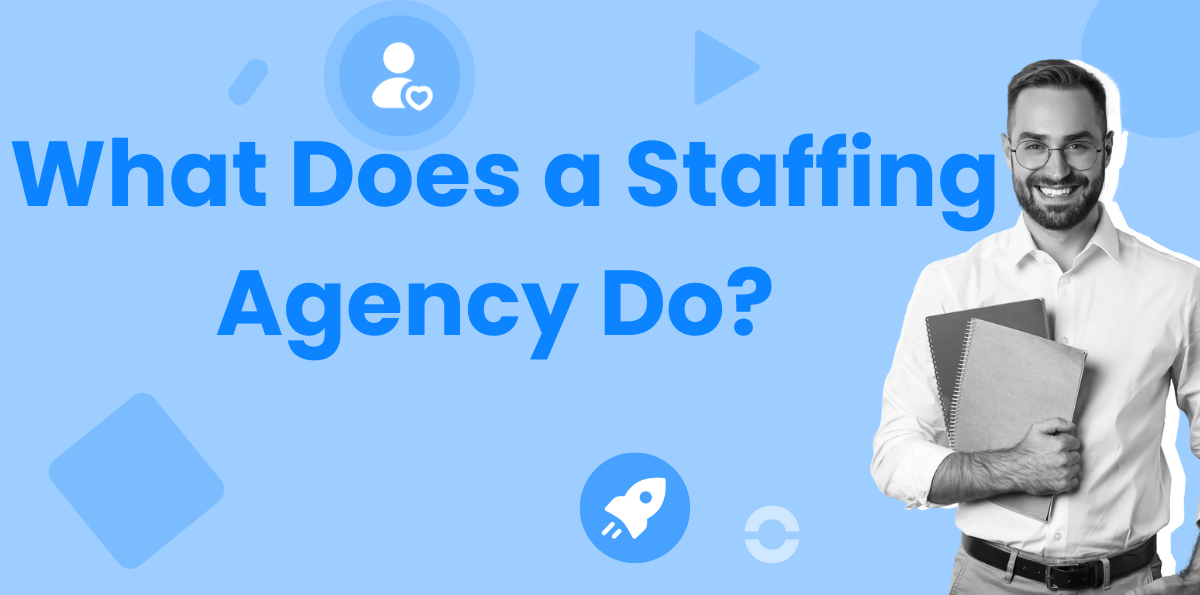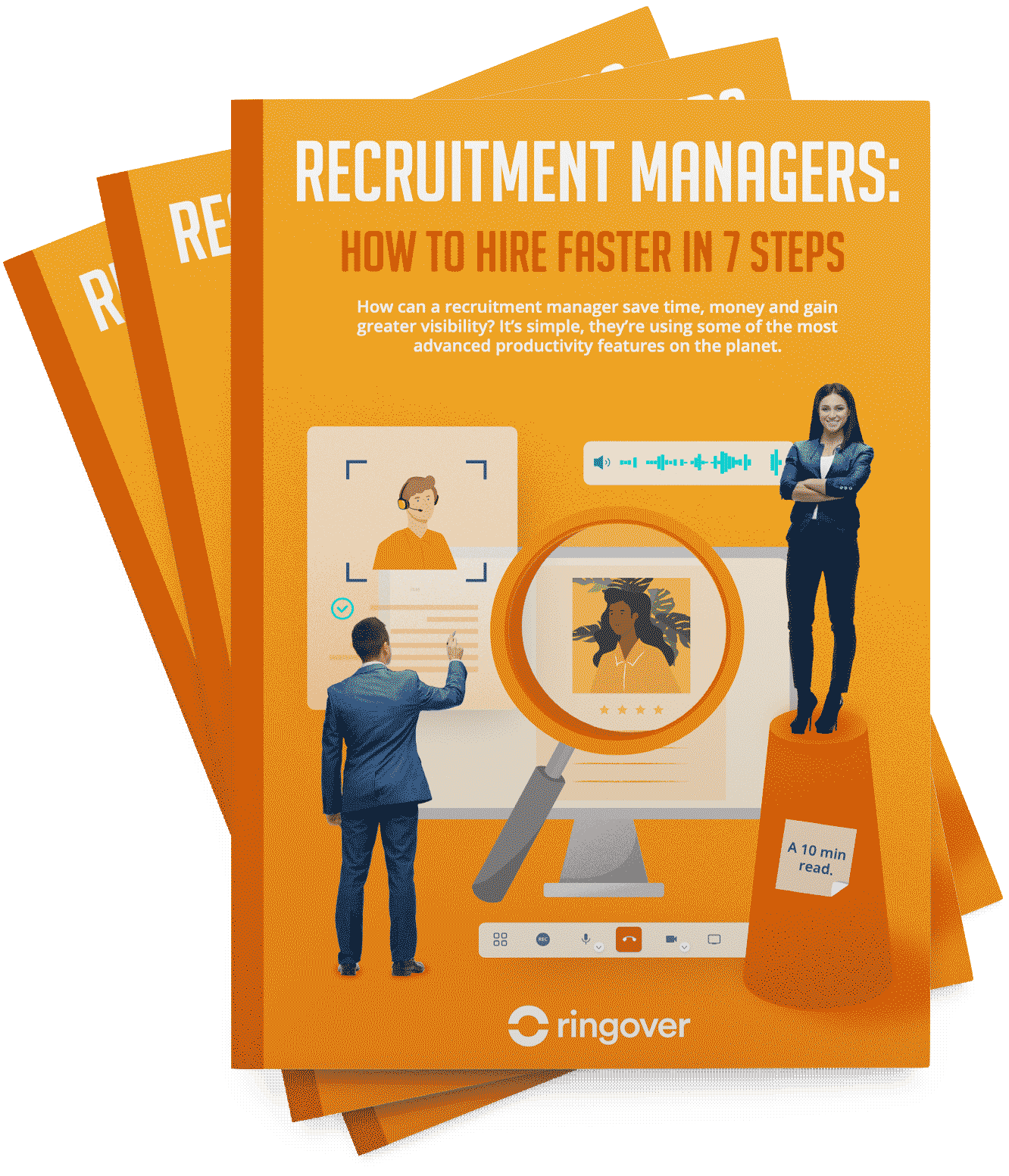Summary
These agencies, often referred to as recruitment firms or employment agencies, manage various aspects of the hiring process. This includes tasks such as crafting job descriptions, screening candidates, and handling contracts and payroll. Whether you're a job seeker searching for the ideal role or an employer looking to efficiently fill a position, understanding the role of a staffing agency can significantly enhance your employment journey.
Discover Ringover for RecruitmentWhat does a staffing agency do? How do they work?
Staffing agencies play a multifaceted role in the employment process, acting as a bridge between job seekers and employers. Here's a detailed look at the services they provide:
Employer Contact and Job Specification
When an employer needs to fill a position, they contact a staffing agency that specializes in their industry. The employer provides the agency with detailed job requirements, including the number of employees needed, the pay rate, and the duration of the employment.
Based on this information, the agency crafts a job description and advertises it on their website, job boards, and sometimes through social media and professional networks.
Candidate Application and Screening
Job candidates can apply for job openings through the agency's website or by meeting with recruiters. The recruiters review the candidates' skills, experience, and background to match them with suitable positions.
This process often includes initial interviews, skills assessments, and background checks to ensure the candidates meet the employer's criteria. The agency also provides feedback to candidates to help them improve their chances of being selected.
Interview and Hiring Process
Once the agency identifies potential candidates, they conduct screening interviews. Depending on the position, employers may also participate in the interview process. The agency introduces the selected candidates to the employers, who then make the final hiring decision.
This streamlined process saves time for both parties and ensures that the best candidates are presented for the job.
One way to simplify the interview process is by leveraging a business phone system such as Ringover, a superior communication platform for staffing agencies.
Ringover provides unlimited calling and various productivity features to manage call campaigns, but it also provides multichannel communications to ease the staffing process. For example, you can easily conduct video conferences or reach candidates via unconventional channels like WhatsApp for recruiting or social media thanks to omnichannel software.
Contract and Payroll Management
Staffing agencies handle most of the administrative tasks associated with hiring, including managing contracts, payroll, and employment taxes. For temporary positions, the agency pays the employees directly and manages their employment taxes.
If the temporary worker is later hired permanently by the employer, the employer takes over the payroll responsibilities. This management of paperwork and financial aspects helps employers save time and energy.
Additional Services
In addition to their primary roles in recruitment and hiring, staffing agencies frequently offer a range of supplementary services. These can include human resource consulting, assistance with onboarding processes, and compliance management. Many agencies also provide career counseling and professional development support for candidates, helping them enhance their interview skills and refine their job search strategies.
Types of Staffing Agencies
When navigating the world of staffing agencies, it's important to understand the various types that exist, each catering to different needs and industries. Here's a breakdown of some of the key types of staffing agencies:
General Staffing Agencies
General staffing agencies are versatile and provide a broad range of services across multiple industries. They manage all aspects of employment, from temporary and contract placements to permanent full-time positions.
These agencies, such as Adecco, serve as one-stop solutions for companies with diverse hiring needs, connecting professionals with employers in fields like accounting, marketing, hospitality, and more.
Temporary Employment Agencies
Temporary employment agencies specialize in providing workers for short-term needs, such as seasonal work, special projects, or covering employee absences. These agencies, like Select Staffing, excel in recruiting candidates for day-to-day or week-to-week positions, offering flexibility for businesses that need quick, temporary support.
They handle the contractual aspects, including employment contracts, payroll, and benefits.
Executive Staffing Agencies
Executive staffing agencies, also known as executive search firms or headhunters, focus on recruiting top-tier executives and highly skilled professionals. These agencies, such as Toptal, use targeted search strategies to attract passive candidates who are not actively seeking new opportunities.
They are often engaged for high-level executive roles that require an extensive search process.
Specialized Staffing Agencies
Specialized staffing agencies concentrate on particular industries or roles, offering deep expertise and targeted recruitment services. For example, IT recruitment agencies specialize in contracting workers for projects in computer science or communications technology, while medical staffing agencies focus on healthcare roles like nurses, doctors, and medical technicians.
Contingency Employment Agencies
Contingency employment agencies operate on a no-placement, no-fee basis, earning their fee only when they successfully place a candidate. This model is appealing to companies looking to fill roles without incurring upfront costs. These agencies are especially useful for time-sensitive positions where companies need to hire quickly.
Retained Search Firms
Retained search firms maintain an exclusive relationship with clients, charging a retainer fee to conduct a thorough and dedicated search for top candidates. This approach is often preferred for high-level executive roles that demand an extensive search process.
Companies typically pay an advanced deposit for these services, and the process can take several weeks to complete.
Online Staffing Agencies
Online staffing agencies utilize digital technology to simplify the recruitment, selection, and placement process. These agencies can manage positions ranging from blue-collar to executive levels, leveraging online platforms to make hiring faster and more efficient. They are particularly beneficial in today's digital era, where remote work is increasingly common.
Cross-Sector Staffing Agencies
Cross-sector staffing agencies offer recruitment services across multiple industries, providing flexibility for companies with diverse hiring needs. These agencies have expertise in various fields, enabling them to cater to a wide range of clients.
They specialize in recruiting candidates for jobs in multiple sectors, delivering cross-industry consulting and placement services.
International Staffing Agencies
International staffing agencies focus on recruiting, selecting, and placing candidates for overseas roles. They often provide international relocation services, making them essential for global companies seeking talent abroad.
These agencies handle the complexities of international hiring, such as visa requirements and cultural adjustments.
Remote Staffing Agencies
With the rise of remote work, remote staffing agencies have become essential for companies aiming to recruit talent capable of working from any location. These agencies specialize in placing candidates in remote or teleworking positions, addressing the growing demand for flexible and remote employment opportunities.
Improve communication with your agency and candidates by deploying an omnichannel software which offers WhatsApp and texting for recruiting.
Differentiating Between Temp Agencies and Recruiting Agencies
While both temporary employment agencies and recruiting agencies are involved in the hiring process, they serve distinct purposes. Temporary employment agencies focus on providing short-term workers for immediate needs, such as seasonal work or project-based requirements. They handle employment contracts, payroll, and benefits for these temporary workers.
In contrast, recruiting agencies, including contingency or retained search firms, are dedicated to finding permanent or long-term candidates. These agencies often manage the entire recruitment process, which includes screening, interviewing, and placing candidates in full-time positions. Additionally, they may offer services like career counseling and professional development for candidates.
Understanding the differences between these types of agencies helps both job seekers and employers choose the right partner for their specific needs, whether it's filling a short-term gap or finding a long-term team member.
How does a staffing agency make money?
Staffing agencies generate revenue through several distinct models, each designed to align with the varying needs of their clients. Here's a detailed look at how these agencies make money and the fees they charge.
Markup on Temporary Employees
One of the primary revenue streams for staffing agencies is the markup on temporary or contract employees. In this model, the agency charges the client a rate that includes the worker's pay plus a markup for their services. For example, if an employer hires a temporary worker through an agency at an hourly rate of $60, the agency might add a 30% markup, resulting in the employer paying $78 per hour.
The agency uses this markup to cover its costs, including payroll processing, garnishment management, and other administrative tasks.
Placement Fees for Permanent Roles
For permanent placements, staffing agencies typically charge a placement fee, which is often a percentage of the candidate's annual salary. This fee is paid by the hiring company once the candidate is hired and usually after a minimum period of employment, such as 30 to 90 days. The percentage can vary widely but often ranges between 15% to 30% of the candidate's first-year salary.
Flat Fee Model
In the flat fee model, the staffing agency charges a fixed amount for recruiting workers, regardless of the employee's salary or experience. This fee is negotiated before the agency starts sourcing candidates and is not tied to the employee's compensation.
This model is cost-effective for both the employer and the agency, as it provides a predictable and constant cost per hire.
Retainer Model
The retainer model involves the staffing agency receiving payment on a long-term or retainer basis. This is often used for Recruitment Process Outsourcing (RPO), where the agency acts as an extension of the client's HR team. The agency is paid a retainer fee regardless of whether a candidate is placed, making this model ideal for high-level executive searches or ongoing recruitment needs.
Recruitment as a Service
Some staffing agencies provide recruitment as a service, where businesses pay a monthly fee to access the agency's recruitment expertise. This can include on-demand recruiting, offering support on an hourly basis, or a more comprehensive Recruitment Process Outsourcing (RPO) arrangement. This model enables businesses to outsource part or all of their recruitment processes to the agency.
Additional Fees
In addition to primary revenue models, staffing agencies may charge extra fees. For example, if an employer decides to hire a temporary worker permanently, a contract buyout fee might apply.
These fees can vary and are typically outlined in the service agreement between the employer and the staffing agency.
How Fees Are Structured
The fees charged by staffing agencies are often negotiated with clients and can differ based on factors such as the industry, the type of position, and the agency's involvement in the hiring process. For temporary workers, employers pay the agency an hourly rate that includes the worker's wages and the agency's markup. For permanent placements, the fee is generally a percentage of the candidate's salary, payable upon successful placement.
By understanding these revenue models, businesses can better recognize the value staffing agencies provide and the associated costs. This knowledge helps companies make informed decisions about their hiring strategies.
How Can You Decide if You Should Work with a Staffing Agency?
Deciding whether to work with a staffing agency involves considering several key factors that align with your business needs and goals. Here are some points to help you make an informed decision:
1. Define Your Hiring Needs
Start by evaluating the type of positions you need to fill. If you are looking for temporary or contract workers to handle seasonal demands, special projects, or to cover employee absences, a staffing agency can be highly beneficial.
For permanent roles, especially those requiring specialized skills, a staffing agency's extensive candidate pool and rigorous screening processes can be invaluable. If you realize your needs are specific to a particular industry, you could contact a staffing agency specialized in your industry or the type of role you need to fill. An agency with deep industry knowledge can provide candidates who possess the necessary skills and understanding of your industry's specific requirements.
2. Evaluate Your Recruitment Costs
Consider the costs associated with recruiting in-house. Hiring through a staffing agency can save you money on advertising, screening, and interviewing candidates. Additionally, agencies handle payroll and benefits for temporary workers, reducing your administrative burdens and costs related to taxes and benefits packages.
3. Assess the Agency's Recruitment Process
Investigate the agency's recruitment process to ensure it is rigorous and comprehensive. Ask about their sourcing methods, screening procedures, background checks, skills assessments, and reference verification.
Don't forget to check the agency's reputation by reading online reviews, client testimonials, and case studies. Ask for references from current or former clients to get a firsthand account of their experiences. A reputable agency should have a proven history of delivering quality candidates and excellent customer service.
Finally, because engaging a staffing agency is a significant investment, be sure to assess the agency's communication and support levels. Ensure they are responsive, transparent about their pricing and processes, and willing to address your questions.
A good agency should take the time to understand your business and its unique needs, providing ongoing support throughout the staffing process.
4. Assess the Time & Resources Available
Assess how much time and resources your in-house team spends on recruitment. Staffing agencies can expedite the hiring process, allowing your team to focus on core business operations. This is particularly useful if you have limited HR resources or need to fill positions quickly to meet business demands.
5. Quality of Candidates
Think about the quality of candidates you need. Staffing agencies have access to a large pool of qualified candidates and use rigorous screening processes to ensure you get the best fit for your roles. This can be especially important for niche or high-level positions where finding the right candidate is essential.
6. Flexibility and Scalability
Consider the flexibility and scalability your workforce requires. Staffing agencies can assist in rapidly scaling your workforce during periods of growth or seasonal fluctuations. They also provide the flexibility to adjust your workforce as needed.
7. Confidentiality and Sensitivity
When hiring for sensitive or confidential positions, staffing agencies can ensure the discretion and confidentiality necessary. This is especially important for C-suite or high-level roles, where public awareness of the vacancy could have negative consequences.
8. Long-Term Benefits
Evaluate the long-term advantages of collaborating with a staffing agency. Retaining talent hired through an agency can result in lower turnover costs, improved work quality, and higher retention rates. Additionally, this approach supports professional development opportunities, fostering employee commitment and loyalty.
9. Risk Management
Take into account the risks involved in hiring new employees, such as compliance with labor laws and the financial impact of turnover. Staffing agencies can mitigate these risks by managing payroll, benefits, and compliance, thereby reducing your legal and financial exposure.
By thoroughly assessing these factors, you can decide whether partnering with a staffing agency aligns with your business objectives and recruitment strategy, enabling you to make a more informed decision.
Conclusion
When considering the use of a staffing agency, it is important to weigh the pros and cons, understand how they operate, and evaluate the specific needs of your business. Staffing agencies can save you significant time and resources by handling the recruitment process, reducing the time-to-hire cycle, and providing access to a larger talent pool. They also offer flexibility, expertise, and cost savings, while managing payroll, benefits, and other administrative tasks.
As you fine-tune your approach to staffing, don't forget to also consider a business phone system. A VoIP phone gives you greater visibility into your performance and a variety of omnichannel communications tools to rapidly and effectively get in touch with your agency and candidates. To better understand how this type of tool can improve performance, try a free trial today!



